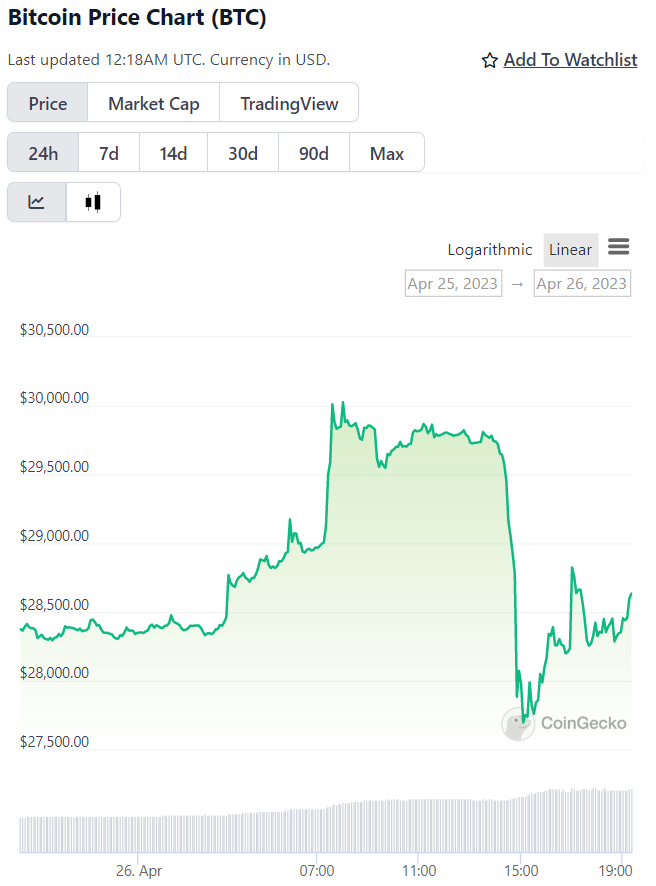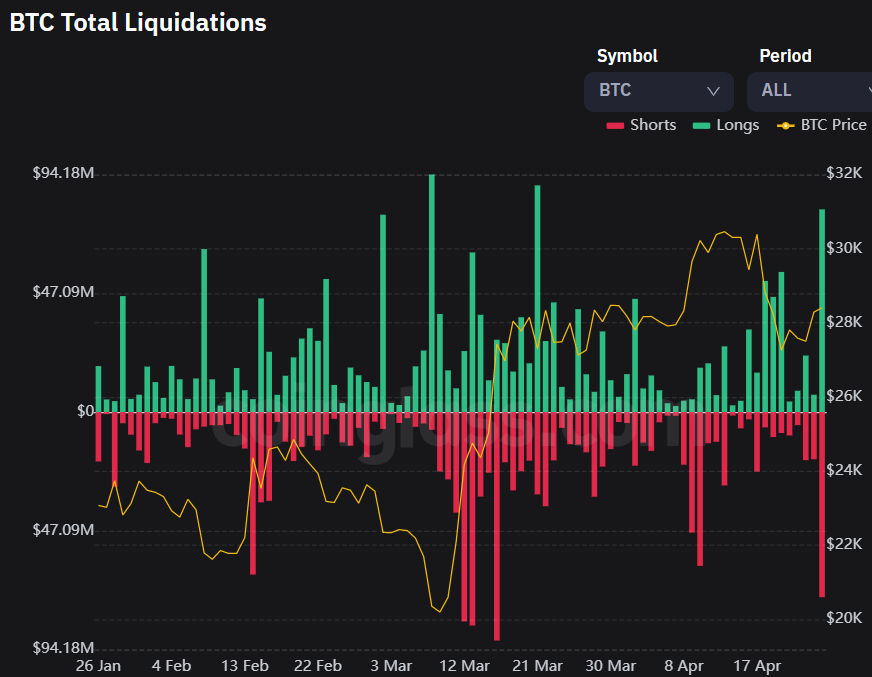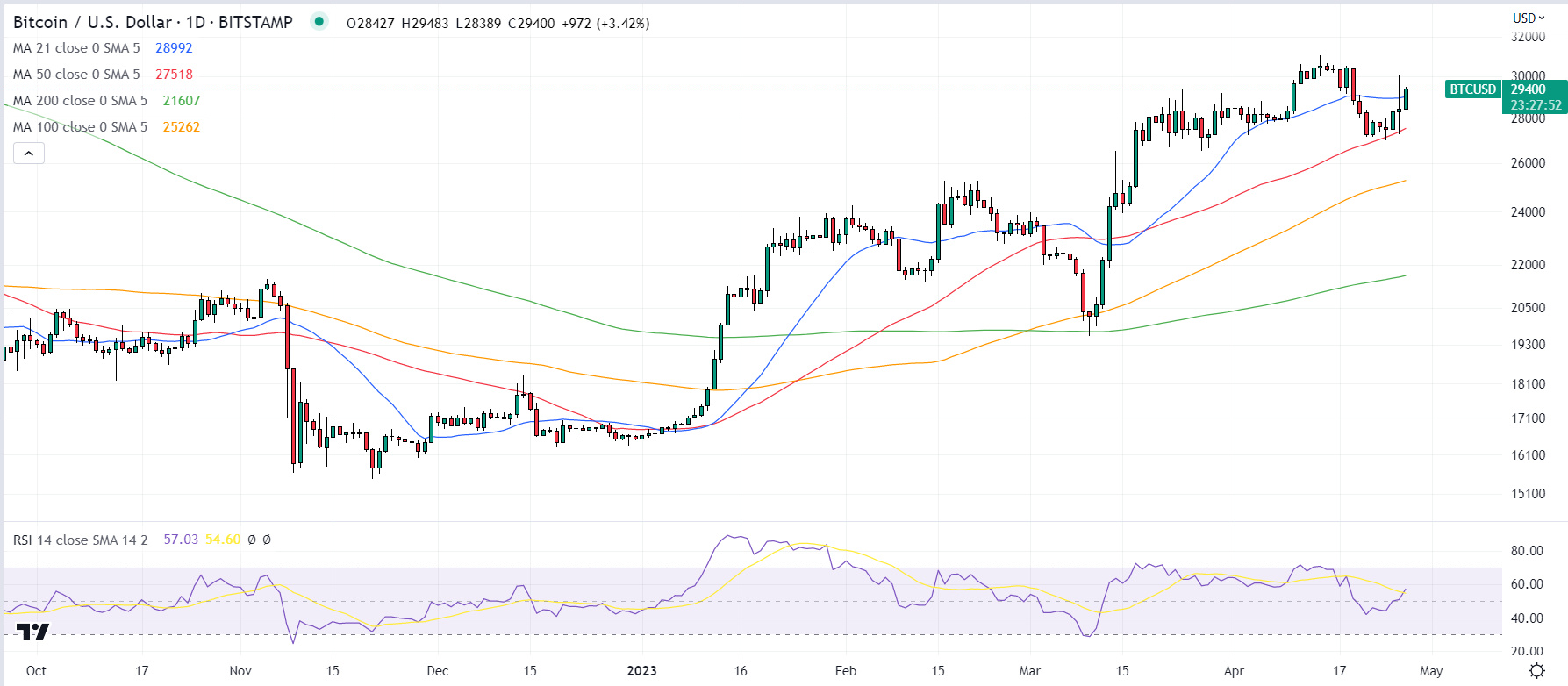The Bitcoin (BTC) price swung wildly on Wednesday.
At one point when the world’s largest cryptocurrency by market capitalization hit session highs early in the day at just above $30,000, BTC was up over 6% on the day.
At session lows later in the day in the $27,200s, the BTC price was as much as 3.8% lower.

Bitcoin’s high-to-low swing of over 9% is the largest such (percentage) intra-day trading range since the cryptocurrency bolted nearly 10% higher in one day back on the 17th of March.
In the end, Bitcoin ended the session broadly flat in the mid-$28,500s, where it continues to trade as Asia Pacific trade gets underway.
But market participants were not left unscathed.
According to crypto derivatives analytics website coinglass.com, leveraged Bitcoin future positions worth more than $150 million were liquidated (i.e. stopped out or “rekt”) on Wednesday.

The split between long and short positions being liquidated was relatively even.
Wednesday thus marked the biggest day for liquidations in the Bitcoin futures market for at least three months.
Short-term Bitcoin bulls will take heart from the fact that the cryptocurrency once again found strong support in the low $27,000s in the form of recent lows and its 50-Day Moving Average.

A short-term buy signal monitored by Bloomberg fired off one week ago when Bitcoin was changing hands just under $29,000.
Historically, BTC gains around 7% within the next 10 days following this trading signal.
If history is a good guide, then the Bitcoin price could be set for a swift rally towards $31,000 over the next three days.
Here Are the Key Themes Driving Bitcoin Right Now
Bitcoin’s chances of mounting a sustained recovery back above $30,000 in the coming days and weeks are looking increasingly strong.
That’s because bank crisis fears, which powered Bitcoin higher in March, are back in focus after earnings from vulnerable US bank First Republic revealed $100 billion in customer withdrawals last quarter, sparking renewed fears about the bank’s solvency and the health of the broader pool of regional US banks.
As concerns about the health of the US banking sector rise, so do concerns about a contraction in bank lending, which typically lead to recessions.
Recession fears thus weighed on the US dollar and US yields on Wednesday and may continue to for the foreseeable future, with traders upping their bets for a rate cutting cycle from the US Federal Reserve later this year.
The combination of concerns about a bank crisis, which boost “safe haven” demand for alternative forms of money such as Bitcoin and gold, and bets on easier financial conditions ahead are major macro tailwinds for Bitcoin right now.
Upcoming US Q1 GDP, March Core PCE inflation and Q1 Employment Cost Index data releases this week will offer important insights into the current state of US growth, inflation and wage inflation – all super-important considerations for the Fed.
If they remain sufficiently robust, this should keep the Fed on course to hike interest rates one more time at its meeting next week (to 5.0-5.25%).
But this rate hikes is widely expected and baked in, with markets much more focused on the coming rate cutting cycle (when it will start, how aggressive it will be etc.).
The Bitcoin (BTC) price swung wildly on Wednesday.
At one point when the world’s largest cryptocurrency by market capitalization hit session highs early in the day at just above $30,000, BTC was up over 6% on the day.
At session lows later in the day in the $27,200s, the BTC price was as much as 3.8% lower.

Bitcoin’s high-to-low swing of over 9% is the largest such (percentage) intra-day trading range since the cryptocurrency bolted nearly 10% higher in one day back on the 17th of March.
In the end, Bitcoin ended the session broadly flat in the mid-$28,500s, where it continues to trade as Asia Pacific trade gets underway.
But market participants were not left unscathed.
According to crypto derivatives analytics website coinglass.com, leveraged Bitcoin future positions worth more than $150 million were liquidated (i.e. stopped out or “rekt”) on Wednesday.

The split between long and short positions being liquidated was relatively even.
Wednesday thus marked the biggest day for liquidations in the Bitcoin futures market for at least three months.
Short-term Bitcoin bulls will take heart from the fact that the cryptocurrency once again found strong support in the low $27,000s in the form of recent lows and its 50-Day Moving Average.

A short-term buy signal monitored by Bloomberg fired off one week ago when Bitcoin was changing hands just under $29,000.
Historically, BTC gains around 7% within the next 10 days following this trading signal.
If history is a good guide, then the Bitcoin price could be set for a swift rally towards $31,000 over the next three days.
Here Are the Key Themes Driving Bitcoin Right Now
Bitcoin’s chances of mounting a sustained recovery back above $30,000 in the coming days and weeks are looking increasingly strong.
That’s because bank crisis fears, which powered Bitcoin higher in March, are back in focus after earnings from vulnerable US bank First Republic revealed $100 billion in customer withdrawals last quarter, sparking renewed fears about the bank’s solvency and the health of the broader pool of regional US banks.
As concerns about the health of the US banking sector rise, so do concerns about a contraction in bank lending, which typically lead to recessions.
Recession fears thus weighed on the US dollar and US yields on Wednesday and may continue to for the foreseeable future, with traders upping their bets for a rate cutting cycle from the US Federal Reserve later this year.
The combination of concerns about a bank crisis, which boost “safe haven” demand for alternative forms of money such as Bitcoin and gold, and bets on easier financial conditions ahead are major macro tailwinds for Bitcoin right now.
Upcoming US Q1 GDP, March Core PCE inflation and Q1 Employment Cost Index data releases this week will offer important insights into the current state of US growth, inflation and wage inflation – all super-important considerations for the Fed.
If they remain sufficiently robust, this should keep the Fed on course to hike interest rates one more time at its meeting next week (to 5.0-5.25%).
But this rate hikes is widely expected and baked in, with markets much more focused on the coming rate cutting cycle (when it will start, how aggressive it will be etc.).
